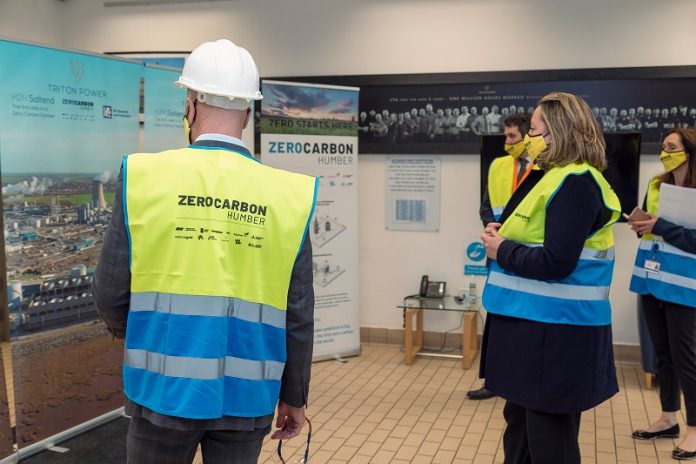Energy Minister Rt Hon Anne-Marie Trevelyan MP visited Saltend Chemicals Park this week to meet leading voices from the Zero Carbon Humber (ZCH) partnership and the wider ‘Northern Endurance Partnership’ (NEP).
The Northern Endurance Partnership (NEP) brings together the Zero Carbon Humber (ZCH) and Net Zero Teesside (NZT) projects to build the onshore and offshore infrastructure to serve both the Humber and Teesside as one cluster, and will enable the deep decarbonization of nearly 50% of the UK’s industrial cluster emissions on the east coast of England.
On Thursday (20 May), the Minister visited the site of the Hydrogen to Humber (H2H) Saltend project, which proposes to build one of the world’s first at-scale low carbon hydrogen production plants, enabling the on-site Triton Power Station to switch to a hydrogen fuel blend and the production of low carbon chemicals and maritime fuels for the international market. It could help to accelerate decarbonisation across the Humber by lowering emissions at one of the Humber’s most industrialised sites.
H2H Saltend is one of the key projects within Zero Carbon Humber, which envisages a CO2 and hydrogen pipeline network connecting to industrial sites and gas and biomass power stations throughout the Humber, enabling them to capture their CO2 emissions, generate negative emissions and/or to switch to low carbon hydrogen.
The Northern Endurance Partnership (NEP) will develop the onshore and offshore CO2 pipeline network, linking to geological storage in the UK Southern North Sea. Captured carbon dioxide (CO2) emissions from the Humber and Teesside will be transported and permanently stored deep underground in Endurance, the UK’s largest appraised saline aquifer for carbon storage.
In March the UK Government announced that all three projects (ZCH, NZT & NEP) had been awarded funding as part of the Industrial Decarbonisation Challenge under the UK Research and Innovation’s (UKRI) Industrial Strategy Challenge Fund (ISCF). The three bids amount to £229 million in private and public funding, with industry contributing two-thirds of the total, and will support the next stage in development of the three projects which will link together to deliver deep reductions in industrial emissions on the east coast of England.
The joint Humber and Teesside initiative aims to be in ‘Track One’ of the Government’s plans for decarbonising industrial clusters across the UK, meaning that infrastructure in both regions could be operational by the mid-2020s.
The proposals would put the region at the vanguard of international decarbonisation efforts and support the UK’s net zero ambition as well as the levelling up agenda. The unrivalled portfolio of projects also helps to future-proof industry whilst protecting and creating tens of thousands of jobs.
Minister Trevelyan met with business leaders from the Zero Carbon Humber partnership and the Northern Endurance Partnership, before taking a tour of Triton Power station and the wider Saltend site where she met apprentices and viewed some of the cutting edge hydrogen technology that will form part of the project.
Minister Rt Hon Anne-Marie Trevelyan said:
“We want the UK to be a world-leader in hydrogen production and carbon capture and it was a pleasure to see up close some of the latest technology at Saltend Chemicals Park today which will be vital as we transition to a green economy.
“These cutting-edge projects are vital in helping decarbonise one of the Humber’s most industrialised areas, making it fit for the future and creating high-skilled employment in the region while supporting our climate commitments.”
Speaking on behalf of the ZCH partnership, Alex Grant, Equinor senior vice president and UK country manager, said:
”Working together, the Humber and Teesside offer a unique opportunity to decarbonise nearly half of the UK’s industrial cluster emissions through the shared transport and carbon storage network provided by the Northern Endurance Partnership. There are several projects in the Humber and Teesside across a range of sectors, including H2H Saltend for hydrogen, that can advance quickly to meet the Government’s Ten Point Plan if the network is in place, allowing existing industries to thrive in a low carbon future and creating new opportunities for highly-skilled jobs in the UK’s industrial heartland.”
Mick Farr, Chief Executive Officer of Triton Power said:
“The most meaningful thing I can say today is that “we can do this!” We have the location, the assets, the technology, the people and the skills and experience. When you combine all this and consider how fast this initiative has come together and the commitment that each partner has shown I believe this is a truly compelling vision for the UK and the region to deliver the energy transition that the region and the country needs.”



